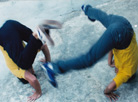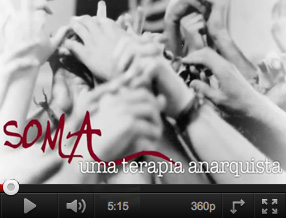Anarchism
Bakunin: Slave is the worst of all evils, Marx, not poverty .
Marx: We can force men to be free, either in the sense of forcing them to act reasonably or preventing them from acting foolishly
Bakunin: Imposed liberty does not deserve to be called liberty .
From “Díálogo Imaginário entre Marx e Bakunin”, de Maurice Cranston, Ed. Imaginário
The ethics of Anarchism has also grounded Soma´s methodology and development. As a therapy centred on studying human behavior, Soma defines neurosis as a product of authoritarian societies, which are inevitably reflected in every sphere of social micro-relations (family, work, personal relationships) , interfering with one’s perception of and attitudes towards society and one’s own individuality.
In his many published essays, particularly “Utopia e Paixão”, “Sem Tesão Não Há Solução” e “Ame e dê Vexame”, Roberto Freire explains the anarchist ethics of Soma, which stems from the socio-political behavior of individuals in their everyday lives. This new ethics entails both the respect for individuality and a strong emphasis on solidarity, whereby a healthy life would mean an ethical searching for pleasure against the conventional notions of sacrifice. Soma’s ideology of pleasure breaks with these traditional leftist notions, shared by both the new international neoliberalism and the canonical Marxism and psychoanalysis
Neither the ‘Socialist Paradise’ nor the anti-social Freudian ‘Death Drive’, which have for long inspired conformism, inertia, submission, skepticism, and helplessness, have a place in Soma’s goal of pursuing anarchistic utopias. Soma therapy rebels against these negatively loaded behaviors by encouraging rebellion against the suffocating neurosis and promoting libertarian activities. Soma attempts to create an environment which affords the development of relational skills, new forms of love, dwelling, and friendship, and as such, radically departing from the values engendered by capitalism .
In the many years of Soma, Soma therapists have been promoting, together with libertarian citizens, a series of events, which include lectures, writing articles and books. We view Anarchism as constantly in-motion, and its dynamic, practical nature is much more important that a set of frozen theories. It is out role, then, to reclaim its original rebelliousness and direct-action perspective to help build new sociabilities. This is our ‘tesão´, our ´somatic anarchism´.
In Soma groups we aim at creating new forms of non-hierarchical, self-managed sociability. These skills are not single properties of the participants; they are forged in the involvement of each single individual with the group dynamic. We create a rich and dynamic therapeutic strategy which mirrors the everyday social interaction, while at the same time challenge it, raising an awareness about one’s role as both and individual and social actor. It is through hands-on experience, rather than theory, that the libertarian process takes place, whereby consensus and leadership are negotiated, and solidarity replaces completion.
The decadence and overall failure of authoritarian societies can only be counteracted by Anarchism – the reinvention of relationships, the creation new forms of socialization and a renewed activism to defy the conventional social hierarchies. To achieve this, we need to be more daring, less shy, and more direct-action oriented to reclaim the utopia of Anarchism.





